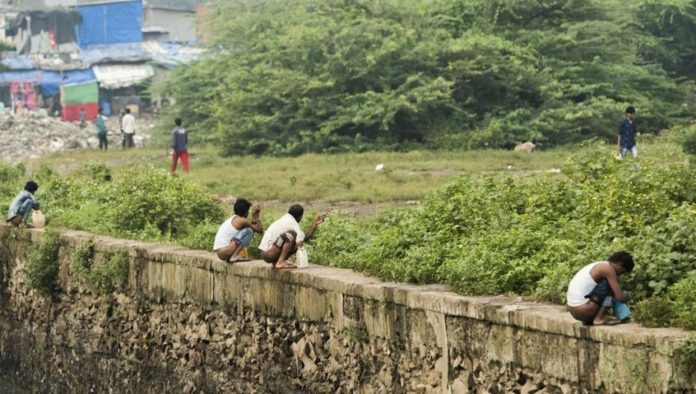Two years ago, one could barely walk a kilometre in Jago Community without seeing faeces, as the people have no improved toilet to defecate.
The head of Jago community, Baale Olusegun Oparinde, told me that due to lack of toilet facilities, his people defecate in the open and in bushes. “This practice has made some of my people fall ill to cholera and exposure to dangerous animals like snake. Some of them defecate close to the river, which is the major source of water in the community. So when rain falls, the faeces are washed into the river; the same river that some of us fetch water for cooking and drinking. There is no way we won’t have cholera outbreaks from time to time,” Baale explained.
Jago community is not the only community in Oyo state still practicing open defecation as a whooping 5,020,920 residents, representing 53.7 per cent of the total population in the state, practice open defecation, while about 3,621,520, representing 43 per cent use unimproved toilet facilities, the National Outcome Routine Mapping (WASHNORM) report revealed.
To change the narrative however, the sum of N80 million was pooled by the state government and the United Nations Children’s Fund (UNICEF) for implementation of Sanitation Revolving Fund (SRF) at a single digit interest rate of nine per cent to households for sanitation facilities construction. This is to create increasing access to sanitation and hygiene.
Baale Oparinde keyed into it, by standing as a guarantor for his people to access the fund, of which they were expected to pay according to their financial status. “I had series of pre-planning meetings with the microfinance Bank and my community members, during which we discussed the project and execution and made plans for the smooth start of the toilet construction,” he disclosed.
As at 19th of October, 2023, LEADERSHIP learnt that over 120 households have installed Satopan, a simple technology, that can easily be implemented in any pit latrine to combat the transmission of communicable diseases.
But that didn’t come without challenges, Oyewunmi Olalekan, a resident in Jago community, told me, even as he disclosed that most of them are farmers, who are struggling to feed their family; yet, it costs N60,000 to N70,000 to install a Satopan. “That is a huge money for us. But because we have seen that our community will no longer smell of faeces and our children will no longer fall sick, especially of cholera, we are paying back the money, the Toilet Business Owners (TBOs) used in setting it up for us,” he further explained.
Olalekan while thanking the government and UNICEF for making the fund available and giving them a long period of time to pay back, however urged neighbouring communities to key into the initiatives, to safeguard the lives of their children and women.
“I must acknowledge that the support from the community was overwhelming throughout the entire process, which began last year. Presently, just few households are without improved toilet. We have started contributing money for them, to ensure that every household has a toilet,” Baale affirmed.
Meanwhile, UNICEF WASH specialist, Lagos state, Dr. Bisi Orebiyi, at a 2-day media dialogue on Open Defecation Free (ODF), South West States of Nigeria, in Oyo state, organised by UNICEF, averred that for Oyo state government to achieve open defecation free by 2028, an estimated N173,191,198,400 is needed to finance the sanitation sector from 2022 to 2028.
“This amount comprises N48,665,040,000 contributions from the communities for household latrine construction and hand washing facility provision in the 33 LGAs. The sum of N103,915,000,000 is required in the construction of institutional latrines and hand washing facilities in public and private schools, public and private health facilities, markets, and motor parks.
“Also, an estimated sum of N15,744,654,400 is required for support services in the areas of advocacy, campaigns, community mobilization, capacity building of state and LGAs officials/communities and monitoring and evaluation,” he disclosed.
While about 70 per cent of the funds must come from government, Orebiyi however called on the government to give more attention to WASH programme at all levels. “Government should release funds and procure all necessary WASH equipment and facilities and embark on public awareness campaign through the media,” he advised.
In his remarks, the commissioner for Information and Orientation, Prince Dotun Oyelade assured that the state government is working assiduously to curb the trend of Open Defecation in the state, while pointing out that many cautionary and enlightenment billboards had been mounted at strategic places across the state to raise the level of awareness.











